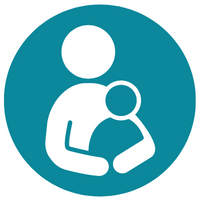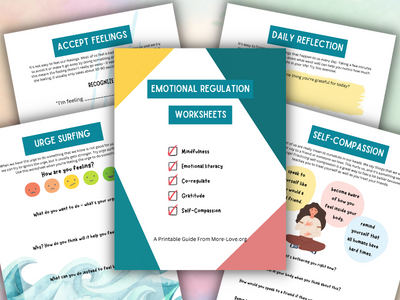
A guide for parents about emotional regulation and eating disorders
Often when kids have eating disorders all our attention goes to stopping the disordered behaviors. We find professionals and experts to treat the symptoms, and that’s important and necessary.
But there’s a lot parents can do to support treatment at home. And next to feeding, emotional regulation is a key parent-led treatment for eating disorders. You are the best person in the whole world to help your child build their emotional regulation skills.
You are more tuned in to your child, and your child is more tuned into you than anyone else. Your relationship and built-in co-regulating relationship can make a huge difference in their recovery!
Parent-Friendly ❤️ Neurobiology ❤️ Attachment ❤️ Non-Diet ❤️ Health At Every Size®
Emotional regulation is an essential part of eating disorder treatment, so working on this with your child is a direct action that will make a difference in their recovery. When you learn how to skillfully co-regulate with your child, you will improve your child’s ability to self-regulate. This is easier said than done, but when you do it well, everyone will feel better! Here are some key things to know about emotional regulation and eating disorders:
What is Emotional Regulation?

All of us have a nervous system that is attuned to internal and external threats. When it perceives a threat, it signals the amygdala, raises cortisol levels, and triggers the flight, fight, or freeze response. This is a physiological response to physical and/or emotional distress, and it’s meant to protect us from bodily harm and becoming socially isolated from our group.
However, in our modern society we are rarely in true danger. As a result, our nervous system response is most often reacting to non-life-threatening situations like being late for a meeting or worrying about a speech we have to give next week.
When faced with distressing thoughts, environments, and situations, our nervous system is triggered and we become dysregulated (highly-reactive) or disengaged (under-reactive). This is nature’s way to prompt us to take action and stay safe.
Emotional regulation is how we get our nervous systems back to a calm, regulated state. This is a skill built over time and involves soothing both the body and the mind to recover a felt sense of safety and security. Some people are more sensitive to threats and less able to emotionally regulate themselves when the nervous system is triggered. They often develop ways to cope that work in the short term but have negative long-term consequences.
Eating Disorders and Emotional Regulation

A person with an eating disorder often struggles with emotional regulation and spends a lot of time being either dysregulated or disengaged. For example, someone may have distressing thoughts about gaining weight and/or they may have distressing physical sensations like nausea, hunger, or fullness. This triggers their alarm system and they use eating disorder behaviors to try and regulate themselves. But these behaviors keep them trapped in a cycle of distress. Therefore, a major goal of treatment is to help a person build emotional regulation skills to replace the eating disorder behaviors.
How to Build Emotional Regulation Skills

Your child’s therapist will work with them on emotional regulation skills during treatment for an eating disorder. The therapist will teach and model emotional regulation skills like reframing thoughts, naming feelings, having self-compassion, and more.
Your child may also start practicing self regulation skills like meditation, yoga, breathing exercises, and other opportunities to connect the mind and body and develop a felt sense of safety. Most residential treatment programs include these activities in an effort to build emotional regulation skills.
All of these are great ways for your child to learn self regulation. But nothing is more powerful for a child’s nervous system than co-regulating with you. Parental co-regulation is when a parent’s nervous system regulates the child’s nervous system. This happens automatically, and is the meaning behind “emotional contagion.” You’ve probably noticed that if you feel dysregulated, your child will feel dysregulated. There can also be an opposite effect in which one of you becomes dysregulated and the other becomes disengaged. But the good news is that if you feel regulated, your child is more likely to get to a regulated state, too. This is a hardwired response that exists in every parent-child relationship.
You can learn to skillfully co-regulate with your child and take an active role in their eating disorder treatment. This is particularly useful during meals and all food-related activities when tensions are high. If you are doing FBT, learning co-regulation skills is essential.
Parental Co-Regulation

Parents are uniquely wired to co-regulate with a child. This is based on our biology. All mammals are born physically and emotionally dependent on their parents, and humans in particular are very dependent for many years. Your nervous system has helped shape your child’s nervous system, and you are deeply attuned and responsive to each other. If you learn skillful co-regulation, you can help your child build their emotional regulation skills.
Here are the benefits of learning emotional regulation skills:
- More balanced and calm state of mind
- Able to cope with worry, negative thoughts, and difficult emotions
- Greater self-awareness
- Able to think more clearly and make better decisions
- Greater emotional balance
- Able to respond rather than react in stressful situations
- More fulfilling relationships
- Greater self-acceptance and self-compassion
By the way, the parent-child connection and potential for emotional contagion exists throughout the lifetime. Adult children remain deeply attuned to parents’ emotions, especially when they have an eating disorder. It’s never too late to make a difference in your child’s ability to regulate their emotions.
Emotional Regulation Worksheets
Give these printable worksheets to grow more confident, calm and resilient and feel better, fast!
- Self-Esteem
- Self-Regulation
- Mindfulness
- Calming strategies
< More About Treating Eating Disorders
Key Articles About Emotional Regulation and Eating Disorders
free cheat sheet: Parenting A Child With An Eating Disorder
⭐ Get ready for recovery and find out how you can prepare yourself for maximum success.
⭐ Find out the essential steps and family rules you need to have in place for recovery.
⭐ Make your home recovery-ready with six simple steps that anyone can do.










